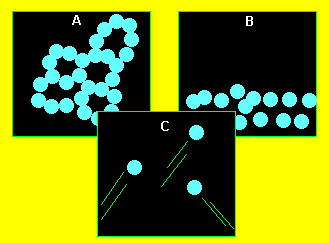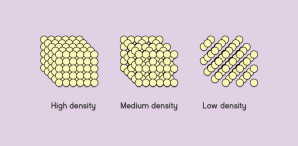Introduction
The Big Idea. – All material in the universe is made of very small particles
Absolutely everything is made of small particles. These are so small that we cannot see them as individual particles but only when lots of them are together. The really important point about this topic is that the particles NEVER CHANGE SIZE, SHAPE or NUMBER. They only move in different ways. The movement of a particle depends on how much energy it has. Just like you, the more energy you have the more you move. When particles move more they spread out more. (Think about you and your friends running around) Particles that speed out are a gas, if they are fairly close together they are a liquid and if they are packed very close together they are a solid. Remember they are still the same particle, just moving about differently.
The Essentials
The image below shows the movement of the SAME particles. Can you DESCRIBE which represents the solid, liquid and gas?

What do you think will happen to the particles in box C if we cool them down?
If box C above was a balloon, can you DESCRIBE what would happen to it if we cooled it down by putting it in the freezer? This is an example of moving particles causing PRESSURE. Why don’t you try this at home and take a picture of before and after.
Make sure you use the 100% sheet for understanding and revision
100% Particle model
Deeper Understanding
Looking at the image above can you EXPLAIN which is the solid, liquid and gas? Remember that EXPLAIN means you must use the word BECAUSE in your answer.
If box C above was a balloon, can you EXPLAIN what would happen to it if we cooled it down by putting it in the freezer? How has the PRESSURE changed?
DENSITY is a measure of how many particles there are in a certain volume. The more particles the more dense it is. We can valuate this form the equation density = mass/volume. If something is less dense than water it will float, if it is more dense it will sink.

Skills Assessment

There are 8 essential skills that you must master is you are to become successful at Science. The skills assessments allow you to practice and develop and improve these skills throughout your science course. See the Skills Page for more information. In this topic the 3 skills we will look to develop are in the white boxes. There are 3 levels for each skill moving to higher levels as you move from left to right. You will be given some time in class to start this assessment but are EXPECTED TO COMPLETE IT OUTSIDE OF CLASS TO ALLOW GREATER THOUGHT, DEEPER THINKING AND INDEPENDENT WORKING.
For help with this assignment you can download the Density skills help sheet
Other Links
Review and Rate your Understanding
Have you learnt all the facts on the 100% sheet?
Have you completed the BBC Bitesize tutorial?
Have you been able to complete all the questions on the 100% sheet?
Let us know how you feel about this topic in the comments section below. Any questions you have, just ask.
